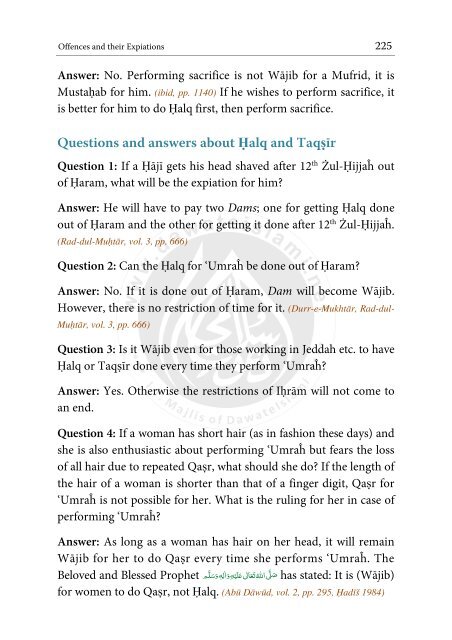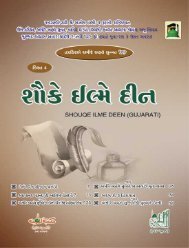- Page 2 and 3:
ۡ ۡ ۡ Rafiq-ul-Haramayn D
- Page 4 and 5:
ۡ ۡ ۡ ۡ ۡ ۡ ۡ
- Page 6 and 7:
ۡ ۡ ۡ ۡ ۡ ٰ
- Page 8 and 9:
56 Intentions for Pilgrims of Hajj
- Page 10 and 11:
56 Intentions for Pilgrims of Hajj
- Page 12 and 13:
56 Intentions for Pilgrims of Hajj
- Page 14 and 15:
56 Intentions for Pilgrims of Hajj
- Page 16 and 17:
ۡ 56 Intentions for Pilgrims o
- Page 18 and 19:
56 Intentions for Pilgrims of Hajj
- Page 20 and 21:
ۡ ۡ ۡ ۡ ۡ ۡ
- Page 22 and 23:
ۡ ۡ ٰ ٓ َّ َ ِ ّٰ ِ ۡ
- Page 24 and 25:
Rafiq-ul-Haramayn 3 5. When perform
- Page 26 and 27:
Rafiq-ul-Haramayn 5 List of items f
- Page 28 and 29:
Rafiq-ul-Haramayn 7 Madanī pearls
- Page 30 and 31:
َ ۡ Rafiq-ul-Haramayn 9 Jeddah to
- Page 32 and 33:
Rafiq-ul-Haramayn 11 5. Show the lu
- Page 34 and 35:
ِ ّٰ ۡ ۙ ّٰ ِ Rafiq-ul-H
- Page 36 and 37:
ْ Rafiq-ul-Haramayn 15 20. If some
- Page 38 and 39:
Rafiq-ul-Haramayn 17 4. If someone
- Page 40 and 41:
Rafiq-ul-Haramayn 19 The angels emb
- Page 42 and 43:
Rafiq-ul-Haramayn 21 said, ‘O you
- Page 44 and 45:
ۡ ۡ ِم ِم ۡ Rafiq-ul-H
- Page 46 and 47:
Rafiq-ul-Haramayn 25 It is stated o
- Page 48 and 49:
َ ّ ُ Rafiq-ul-Haramayn 27 [
- Page 50 and 51:
ۡ َ Rafiq-ul-Haramayn 29 [بَ
- Page 52 and 53:
ۡ Rafiq-ul-Haramayn 31 َم]
- Page 54 and 55:
ۡ Rafiq-ul-Haramayn 33 [حَر
- Page 56 and 57:
Rafiq-ul-Haramayn 35 َط ۡ ن
- Page 58 and 59:
Rafiq-ul-Haramayn 37 28. Mashāĥid
- Page 60 and 61:
Rafiq-ul-Haramayn 39 Method of putt
- Page 62 and 63:
ٰلّ Rafiq-ul-Haramayn 41 I
- Page 64 and 65:
Rafiq-ul-Haramayn 43 words, he will
- Page 66 and 67:
Rafiq-ul-Haramayn 45 either; just t
- Page 68 and 69:
Rafiq-ul-Haramayn 47 3. To comb hai
- Page 70 and 71:
Rafiq-ul-Haramayn 49 3. To apply fr
- Page 72 and 73:
Rafiq-ul-Haramayn 51 women. These d
- Page 74 and 75:
Rafiq-ul-Haramayn 53 Farḍ to be c
- Page 76 and 77:
Rafiq-ul-Haramayn 55 Explanation of
- Page 78 and 79:
ٰ Rafiq-ul-Haramayn 57 water and s
- Page 80 and 81:
Rafiq-ul-Haramayn 59 After making t
- Page 82 and 83:
Rafiq-ul-Haramayn 61 ا َلل
- Page 84 and 85:
Rafiq-ul-Haramayn 63 in our religio
- Page 86 and 87:
Rafiq-ul-Haramayn 65 Translation: Y
- Page 88 and 89:
ِ ُ ِ ٰ ِ Rafiq-ul-Haramayn
- Page 90 and 91:
ِ ُ ِ ٰ ِ ۤ Rafiq-ul-Harama
- Page 92 and 93:
ِ ُ ِ ٰ ِ Rafiq-ul-Haramayn
- Page 94 and 95:
ْ ِ ُ ِ ٰ َ ِ ْ Rafiq-ul-
- Page 96 and 97:
Rafiq-ul-Haramayn 75 Maqām-u-Ibrā
- Page 98 and 99:
Rafiq-ul-Haramayn 77 companions cou
- Page 100 and 101:
Rafiq-ul-Haramayn 79 Translation: O
- Page 102 and 103:
ِ ُ ِ ٰ ِ Rafiq-ul-Haramayn 81
- Page 104 and 105:
ٰ ٰ ٰ Rafiq-ul-Haramayn 83 Wrong
- Page 106 and 107:
ّ ّ ًن Rafiq-ul-Haramayn 85
- Page 108 and 109:
Rafiq-ul-Haramayn 87 Prophet ٖ
- Page 110 and 111:
Rafiq-ul-Haramayn 89 Du’ā to be
- Page 112 and 113:
Rafiq-ul-Haramayn 91 Ḥalq or Taq
- Page 114 and 115:
ۡ َ Rafiq-ul-Haramayn 93 to a hun
- Page 116 and 117:
Rafiq-ul-Haramayn 95 The person usi
- Page 118 and 119:
Rafiq-ul-Haramayn 97 3. To recite c
- Page 120 and 121:
Rafiq-ul-Haramayn 99 Four miscellan
- Page 122 and 123:
ۡ َ ۡ ٖہ Rafiq-ul-Haramayn
- Page 124 and 125:
ٗط◌ ُئ َ Rafiq-u
- Page 126 and 127:
ْ ْ ْ َ ْ Rafiq-ul-Haramayn 1
- Page 128 and 129:
Rafiq-ul-Haramayn 107 وَ اَ
- Page 130 and 131:
ۡ ِ ِم ِم ۡ Rafiq-ul-
- Page 132 and 133:
ُ ۡ َ ۡ ِ ّٰ ِ ۡ َ َ Raf
- Page 134 and 135:
Rafiq-ul-Haramayn 113 Translation:
- Page 136 and 137:
Rafiq-ul-Haramayn 115 to be recited
- Page 138 and 139:
Rafiq-ul-Haramayn 117 O Allah
- Page 140 and 141:
Rafiq-ul-Haramayn 119 Wasīlaĥ of
- Page 142 and 143:
ۡ ۡ ِم ِم Rafiq-ul-Hara
- Page 144 and 145:
Rafiq-ul-Haramayn 123 Method of off
- Page 146 and 147:
ٖہ Rafiq-ul-Haramayn 125 Du’
- Page 148 and 149:
Rafiq-ul-Haramayn 127 bodies were b
- Page 150 and 151:
Rafiq-ul-Haramayn 129 is permissibl
- Page 152 and 153:
Rafiq-ul-Haramayn 131 3. Inspect th
- Page 154 and 155:
Rafiq-ul-Haramayn 133 Performing Qu
- Page 156 and 157:
ْم ْ ۤ Rafiq-ul-Haramayn 135
- Page 158 and 159:
Rafiq-ul-Haramayn 137 3. Although i
- Page 160 and 161:
Rafiq-ul-Haramayn 139 of holding st
- Page 162 and 163:
Rafiq-ul-Haramayn 141 15. Whilst st
- Page 164 and 165:
Rafiq-ul-Haramayn 143 5. There is n
- Page 166 and 167:
َ ۡ َ Rafiq-ul-Haramayn 145 18.
- Page 168 and 169:
Rafiq-ul-Haramayn 147 However, if t
- Page 170 and 171:
Rafiq-ul-Haramayn 149 17. If one pe
- Page 172 and 173:
ۡ ۡ ۡ ۡ ۡ َ ۡ ۡ
- Page 174 and 175:
ۡ Journey to Madīna-tul-Munawwara
- Page 176 and 177:
ۡ ۡ ِ ّٰ ۡ Journey to Madīna
- Page 178 and 179:
ِ ِ َ َ َ ُ َو Journey t
- Page 180 and 181:
Journey to Madīna-tul-Munawwaraĥ
- Page 182 and 183:
Journey to Madīna-tul-Munawwaraĥ
- Page 184 and 185:
ۡ ۡ ِ ۡ Journey to Madīna-tul-
- Page 186 and 187:
Journey to Madīna-tul-Munawwaraĥ
- Page 188 and 189:
ٰ ۡ ٰ ٰ َو ۡ Journey
- Page 190 and 191:
ُ Journey to Madīna-tul-Munawwara
- Page 192 and 193:
Journey to Madīna-tul-Munawwaraĥ
- Page 194 and 195:
َ َو َو َ Journey to M
- Page 196 and 197: Journey to Madīna-tul-Munawwaraĥ
- Page 198 and 199: ۡ ۡ ُ ُ َ َ Journey to Madīn
- Page 200 and 201: ۡ Journey to Madīna-tul-Munaww
- Page 202 and 203: ۡ ۡ ۡ ۡ ۡ ۡ
- Page 204 and 205: Offences and their Expiations 183 e
- Page 206 and 207: Offences and their Expiations 185 o
- Page 208 and 209: Offences and their Expiations 187 N
- Page 210 and 211: Offences and their Expiations 189 t
- Page 212 and 213: Offences and their Expiations 191 V
- Page 214 and 215: Offences and their Expiations 193 b
- Page 216 and 217: Offences and their Expiations 195 A
- Page 218 and 219: Offences and their Expiations 197 Q
- Page 220 and 221: Offences and their Expiations 199 Q
- Page 222 and 223: Offences and their Expiations 201 H
- Page 224 and 225: Offences and their Expiations 203 Q
- Page 226 and 227: Offences and their Expiations 205 Q
- Page 228 and 229: Offences and their Expiations 207 A
- Page 230 and 231: Offences and their Expiations 209 W
- Page 232 and 233: Offences and their Expiations 211 I
- Page 234 and 235: Offences and their Expiations 213 Q
- Page 236 and 237: Offences and their Expiations 215 n
- Page 238 and 239: Offences and their Expiations 217 h
- Page 240 and 241: Offences and their Expiations 219 Q
- Page 242 and 243: Offences and their Expiations 221 Q
- Page 244 and 245: Offences and their Expiations 223 h
- Page 248 and 249: Offences and their Expiations 227 a
- Page 250 and 251: Offences and their Expiations 229 o
- Page 252 and 253: Offences and their Expiations 231 Q
- Page 254 and 255: ۡ Offences and their Expiation
- Page 256 and 257: ۡ Offences and their Expiations
- Page 258 and 259: Offences and their Expiations 237 T
- Page 260 and 261: Offences and their Expiations 239 A
- Page 262 and 263: Offences and their Expiations 241 w
- Page 264 and 265: Offences and their Expiations 243 g
- Page 266 and 267: Hajj of Children 245 has further st
- Page 268 and 269: Hajj of Children 247 Question 7: Is
- Page 270 and 271: Hajj of Children 249 recited to suc
- Page 272 and 273: Hajj of Children 251 Answer: Regard
- Page 274 and 275: Hajj of Children 253 It is not allo
- Page 276 and 277: ۡ ۡ Glossary 255 َل] Jaba
- Page 278 and 279: Glossary 257 َة] Sūraĥ Ch
- Page 280 and 281: Bibliography 259 Fatāwā ‘Ālamg
- Page 282 and 283: Index ‘Arafaĥ ..................
- Page 284 and 285: Index 263 Mimbar ..................
- Page 286 and 287: Table of Contents Du’ā for Readi
- Page 288 and 289: Table of Contents 267 Important rul
- Page 290 and 291: Table of Contents 269 Important adv
- Page 292 and 293: Table of Contents 271 158 ......
- Page 294 and 295: Table of Contents 273 Questions and

















